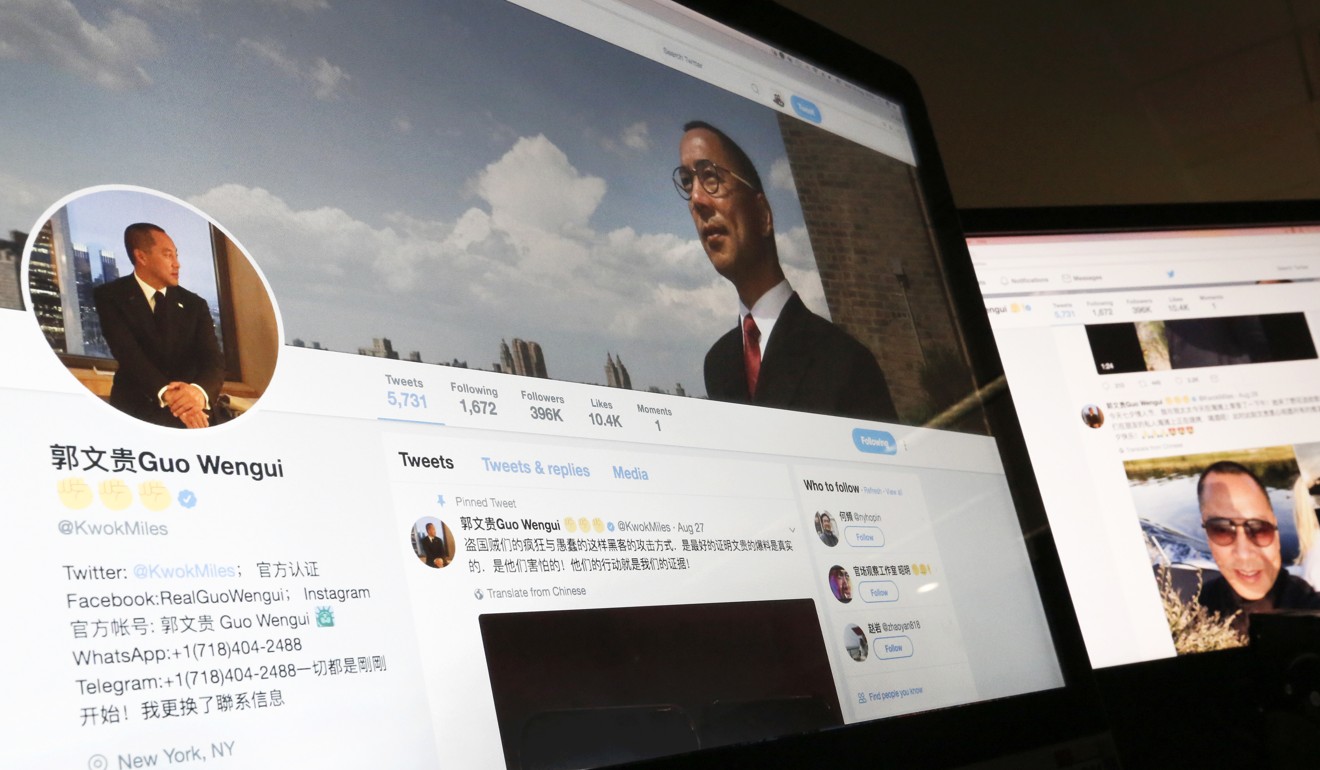
China denies involvement in US cyberattacks linked to fugitive tycoon Guo Wengui
Hudson Institute was to host an event with fugitive tycoon Guo Wengui, while law firm was helping him with his political asylum application
China on Saturday denied it was involved in a cyberattack against a Washington think tank that was to host an event with fugitive tycoon Guo Wengui, as well as the US law firm helping him with his asylum application.
The Ministry of Public Security also said in a press release that China had provided evidence to the US government that documents presented by Guo to support some of his allegations against China were forged. It said it would make a formal request to Washington to investigate the matter.
The press release was issued after Chinese Minister of Public Security Guo Shengkun visited the United States this week, and just ahead of the Communist Party’s most important political event later this month.
US Attorney General Jeff Sessions raised the issue of the cyberattacks during that visit with Chinese officials, US media reported.
The ministry said it had not found any evidence to suggest the attack that took down the website of the Hudson Institute earlier this week had originated from China.
Shortly after the institute said it detected a Shanghai-based cyberattack, it cancelled a scheduled appearance by exiled billionaire Guo, citing poor planning and logistics – and fuelling speculation that it had been pressured to do so by Beijing.

China also denied responsibility for a recent cyberattack against Clark Hill, the law firm that filed Guo’s application for political asylum in the United States in September.
“The Chinese government would like to suggest that the US law enforcement authorities supply China with the detailed information, relevant clues and evidence, so that China could assist in the investigations to identify the real source of such hacking,” the ministry said, adding it would cooperate fully in any investigation.
It also said it had provided evidence to the US government that Guo had “falsified documents”, adding that it would formally request that the authorities investigate.
“A while ago, the Chinese authorities already informed and provided evidence to the US government, with many documents blatantly forged by Guo – including the one he displayed on October 6 – in order to mislead in favour of his political asylum case,” it said.
That was a reference to documents Guo presented during an appearance at the National Press Club in Washington on Thursday when he claimed Chinese authorities had secretly sent dozens of spies to the US.
The ministry said Guo’s “continuous criminal acts” have “the devious intention of deliberately damaging the relationship between the US and China”.
Guo, a property developer who is living in exile in the US, is wanted by China on corruption charges and is one of around 600 fugitives it wants to repatriate through Interpol, which has also targeted those suspected of fleeing President Xi Jinping’s sweeping anti-graft campaign. An Interpol red notice was issued for Guo in April at the request of Beijing as part of its ongoing public relations offensive to discredit the businessman and the series of claims he has made over the past nine months.
His stream of unverifiable allegations about high-level corruption have frustrated Chinese officials, particularly in the lead-up to China’s twice-a-decade party congress, a key political gathering that the party is keen to ensure goes smoothly.
He is under investigation in China over at least 19 major criminal cases, with claims levelled against him including bribery, fraud and money laundering, and a rape allegation made by his former personal assistant. Multiple individuals and companies have sued Guo for his allegations, including Vice-Minister for Housing and Urban-Rural Development Huang Yan, Chinese conglomerate HNA Group, Caixin Media, and real estate company Soho China.
The ministry’s press release followed Guo Shengkun’s trip to Washington for a China-US dialogue, during which he called for the US to work with Beijing on cybersecurity and the repatriation of fugitives. The dialogue was a high-level communication channel set up after the meeting between Xi and US President Donald Trump in April and took place the same day the Hudson Institute event with Guo was due to be held.

